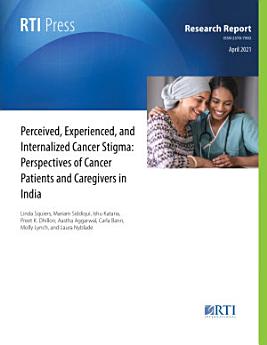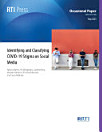Perceived, experienced, and internalized cancer stigma
इस ई-बुक के बारे में जानकारी
लेखक के बारे में
Senior Health Communication Scientist
Education
PhD, Health Education, University of Maryland, College Park
MA, Health Education, University of Maryland, College Park
BS, Family Studies, University of Maryland, College Park
Linda Squiers, PhD, is a senior health communication scientist with over 25 years of experience in health communication. She works hand-in-hand with clients to develop health campaigns, programs, trainings, digital tools and educational materials. She leads research studies using methods such as virtual focus groups, in-depth interviews, design-thinking activities and surveys.
Dr. Squiers has published more than 40 peer-reviewed journal articles on communicating about a wide variety of health issues, including cancer, Ebola, Zika virus, smoking cessation, e-cigarettes, prescription drugs, preconception health, and health literacy. She led the development of the U.S. Centers for Disease Control and Prevention’s (CDC’s) Clear Communication Index.
Dr. Squiers works with the March of Dimes to develop, implement and evaluate Beyond Labels—a program to increase public health professionals’ awareness of health-related stigma—and with CDC to develop and evaluate a national social media campaign to increase awareness of the impact of opioids.
Senior Public Health Researcher
Education
PhD, Public Health and Nutrition (Noncommunicable diseases), University of Delhi
MSc, Food and Nutrition, University of Delhi
Ishu Kataria is a Senior Public Health Researcher with RTI’s Center for Global Noncommunicable Diseases. Dr. Kataria has a Masters and PhD in Public Health and Nutrition from University of Delhi, India, and works on noncommunicable disease (NCD) prevention and control both in India as well as globally. She has experience in conceptualizing and developing training interventions, and designing and implementing programs on cancer prevention, adolescent NCDs, maternal and child health, and behavior change communication.
Dr. Kataria has served as a Special Advisor to the World Health Organization for NCDs and is the NCD focal point for the United Nations Major Group for Children and Youth. She is also the Global Coordinator for the Young Professionals Chronic Disease Network (YP-CDN)—a global nonprofit that works to mobilize young leaders worldwide to take action against social injustice driven by NCDs. At YP-CDN, she works with young local community leaders at the grassroots level for doing advocacy campaigns on NCDs and access to medicines. She also co-chairs the recently established Youth Coalition on NCDs.
Dr. Kataria developed experience in capacity building by working with the Aga Khan Foundation to conceptualize and develop training modules on growth monitoring and promotion for community health workers as well as on nutrition and hygiene for women’s self-help groups. For the World Obesity Federation, she documented policy and evidence in India to provide an evidence-based model for effective integrated intervention approaches in preventing and reducing the prevalence of obesity and related co-morbidities. She has also worked with the All India Institute of Medical Sciences for their community outreach program using the positive deviance approach, and the Ministry of Women and Child Development, Government of India, on their Integrated Child Development Services initiative.
Fellow, Health Policy
Education
PhD, Demography, University of Pennsylvania
MA, Demography, University of Pennsylvania
BA, Economics, Pennsylvania State University
Laura Nyblade is an expert on stigma and discrimination in the context of public health. As a senior technical advisor for RTI’s Global Health Division, she leads several initiatives aimed at measuring and reducing stigma, especially surrounding HIV and AIDS.
Dr. Nyblade’s projects have reached patients, health care professionals, and policymakers around the world. She has led a global initiative to develop, test, and standardize a tool for measuring stigma and discrimination among health facility staff. She has supported national AIDS programs in the Caribbean and conducted research on preventing mother-to-child HIV transmission. In South and South-East Asia and sub-Saharan Africa, she has collaborated with governments to promote evidence-based stigma-reduction programs, engage different audiences, and support improved policies.
Before joining RTI in 2011, Dr. Nyblade served as Director of Stigma, Discrimination, and Gender at the International Center for Research on Women. She has an academic background in demography, and has provided technical guidance for the U.K. Department for International Development, the Joint United Nations Programme on HIV/AIDS, the U.S. Agency for International Development, and the World Bank.
Senior Fellow, Statistics and Psychometrics
Education
PhD, Quantitative Psychology, University of North Carolina at Chapel Hill
MA, Quantitative Psychology, University of North Carolina at Chapel Hill
BA (summa cum laude), Mathematics, Arizona State University
BS (summa cum laude), Psychology, Arizona State University.
Carla Bann, PhD, is an expert in statistics and psychometrics with more than 20 years of experience in advanced statistical and psychometric analyses, program evaluation, and index and scale development. She received the designation of RTI Fellow in 2009.
Much of Dr. Bann’s research is focused on improving maternal and child health outcomes. Currently, she is the PI for the NIH HEAL Initiative ACT NOW Outcomes of Babies with Opioid Exposure (OBOE) Longitudinal Study which is investigating the impact of antenatal opioid exposure on infants from birth to two years of age. She is also Alternate PI for the Data Coordinating Center of Neonatal Research Network, a multi-site collaboration among medical centers across the U.S. focused on improving outcomes among infants born at extremely low birth weight.
Dr. Bann has also conducted research on health-related communication, knowledge, quality of life, and informed decision making. She has published her research findings in several peer-reviewed journals, including British Medical Journal (BMJ), New England Journal of Medicine, JAMA Pediatrics, JAMA Network Open, Lancet Neurology, and Pediatrics.


